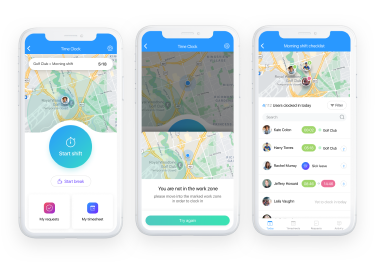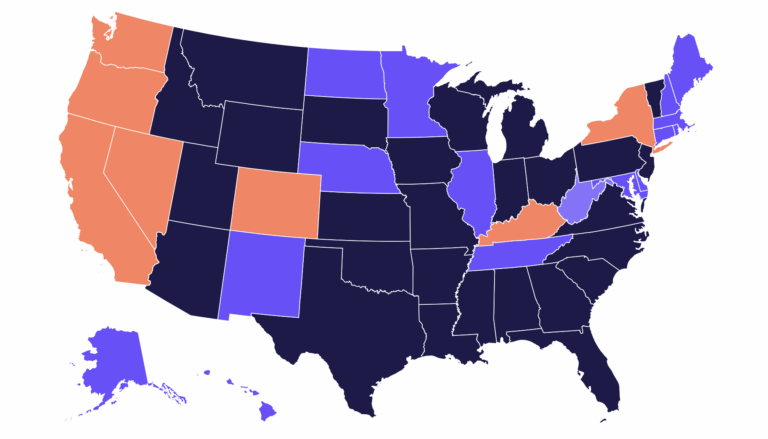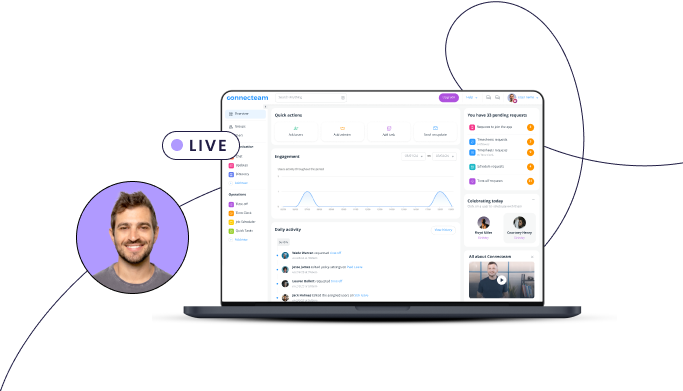Not sure if you need to offer or pay for employee breaks? If you don’t know your state’s laws, it could cost you. We’ve gathered all the meal and rest break rules by state, so you don’t have to.
Just like state birds and license plates, break laws change from coast to coast.
Whether you’re running a small business or managing a large team, knowing your state’s meal and rest break rules is key.
In this guide, we simplify what’s required, state by state, so you can stay compliant and avoid legal trouble.
Why Do Breaks Matter?
Break policies might seem like small details, but they can become legal problems if you don’t handle them correctly. One missed rest break or an unpaid working lunch can lead to fines, lawsuits, or a hit to your company’s reputation.
Compliance isn’t just a legal checkbox; it’s a key part of responsible workforce management. While it may seem easier to apply a one-size-fits-all break policy, labor laws vary significantly by state and are subject to change. Employers are expected to stay informed and up to date.
Beyond risk management, offering paid meal and rest breaks can positively impact your team and your operations, including:
- Lower stress levels
- Increased productivity
- Reduced absenteeism
- Higher employee satisfaction and retention
Providing structured, paid breaks is a legal safeguard, but it’s also a smart investment in your workforce.
Federal Break Law Overview
Before we dive into state-specific laws, it’s important to understand what federal law actually requires. Many employers assume there’s a universal rule around break times, but in reality, the Fair Labor Standards Act (FLSA) doesn’t mandate that employers provide breaks at all.
That said, if you do offer breaks, federal law sets clear guidelines on how they should be handled and compensated. Whether it’s a 10-minute coffee break or a “working” lunch, how that time is treated under the law matters.
Understanding the federal baseline is key. It helps you avoid common compliance mistakes and ensures you’re not accidentally underpaying employees for time they’re legally owed.
Here’s what federal law does and doesn’t say about breaks, under the Fair Labor Standards Act (FLSA):
- Meal breaks (usually 30+ minutes) don’t have to be offered, but if an employee works through lunch, you have to pay them.
- Short breaks (5–20 minutes) are considered part of the workday and must be paid.
- Unpaid meal breaks are only allowed if the employee is completely off-duty and doesn’t perform any work-related task.
- Breaks for nursing mothers are required under specific conditions, including time and space for pumping.
So while federal law doesn’t require employers to offer breaks, it does set clear rules for how those breaks must be handled if you do offer it.
Did You Know?
Using break management software like Connecteam can help you automatically track employee hours, including breaks, for accurate reporting and easier payroll. It saves time, reduces errors, and takes the guesswork out of compliance.
Experience The Power of Accurate & Reliable Employee Time Tracking with Connecteam!
14-day free trial, no credit card required!

Break Compliance Laws By State
Here’s a state-by-state breakdown of meal and rest break laws to help you stay compliant wherever your team works.
Need the highlights? Use our tool below to explore your state’s break laws.
US Meal and Rest Break Laws by State
Click on a state for detailed information.
Alabama
Meal Breaks: Not required under state law.
Rest Breaks: Not required under state law.
Read our full guide on Alabama state labor laws.
Alaska
Meal Breaks: Required only for minors (14–17): 30-minute break after 5 consecutive hours.
Rest Breaks: Not required for adults.
Additional Notes: Breaks of 20 minutes or less must be paid. Unpaid meal periods over 20 minutes are allowed only if the employee doesn’t perform work. Nursing break protections are covered under federal law.
Read our full guide on Alaska state labor laws.
Arizona
Meal Breaks: Not required under state law.
Rest Breaks: Not required, but if provided (e.g., two 10-minute breaks), they must be paid.
Additional Notes: Meal breaks must be non-working to be unpaid.
Read our full guide on Arizona state labor laws.
Arkansas
Meal Breaks: Not required under state law.
Rest Breaks: Not required.
California
Meal Breaks: Required: 30-minute unpaid break after 5 hours. A second 30-minute break is required after 10 hours, unless waived.
Rest Breaks: Required: 10 minutes of paid rest for every 4 hours worked or close to that time.
Additional Notes: On-duty meal periods are only allowed under strict conditions with a written agreement. California also mandates “cool-down” recovery periods to prevent heat illness.
Read our full guide on California state labor laws.
Colorado
Meal Breaks: Required: 30-minute unpaid break if a shift exceeds 5 consecutive hours.
Rest Breaks: Required: Paid 10-minute break for every 4 hours worked.
Additional Notes: Applies only to certain industries (e.g., retail, food service, healthcare). Many roles are exempt, including professionals, drivers, and household workers.
Read our full guide on Colorado state labor laws.
Connecticut
Meal Breaks: Required: 30-minute unpaid break for employees working 7.5+ consecutive hours.
Rest Breaks: Optional, but if rest breaks are paid and provided, a meal break may not be required.
Additional Notes: Meal break must be scheduled after the first 2 hours and before the last 2 hours of a shift.
Delaware
Meal Breaks: Required: 30-minute unpaid break for employees working 7.5+ consecutive hours.
Rest Breaks: Not required.
Additional Notes: Break must be provided between the 2nd and last 2 hours of the shift.
District of Columbia (D.C.)
Meal Breaks: Not required.
Rest Breaks: Not required.
Florida
Meal Breaks: Not required.
Rest Breaks: Not required.
Read our full guide on Florida state labor laws.
Georgia
Meal Breaks: Not required.
Rest Breaks: Not required.
Read our full guide on Georgia state labor laws.
Hawaii
Meal Breaks: Not required.
Rest Breaks: Not required.
Idaho
Meal Breaks: Not required.
Rest Breaks: Not required.
Illinois
Meal Breaks: Required: 20-minute unpaid meal break for employees working 7.5+ continuous hours. Must begin no later than 5 hours into the shift.
Rest Breaks: Required only for hotel room cleaners: two paid 15-minute breaks for shifts of 7+ hours.
Additional Notes: Employees must be given a suitable break area and cannot be required to work during breaks.
Read our full guide on Illinois state labor laws.
Indiana
Meal Breaks: Not required.
Rest Breaks: Not required.
Read our full guide on Indiana state labor laws.
Iowa
Meal Breaks: Not required.
Rest Breaks: Not required.
Kansas
Meal Breaks: Not required.
Rest Breaks: Not required.
Additional Notes: If a meal break is less than 30 minutes, it must be paid.
Kentucky
Meal Breaks: Required: A “reasonable” unpaid break must be provided between the 3rd and 5th hour of work.
Rest Breaks: Required: One paid 10-minute break per 4 hours worked.
Additional Notes: Employers must provide accommodations for pregnant or nursing employees unless it’s too difficult for the employer.
Read our full guide on Kentucky state labor laws.
Louisiana
Meal Breaks: Not required.
Rest Breaks: Not required.
Maine
Meal Breaks: Required: 30-minute unpaid meal break after 6 consecutive hours.
Rest Breaks: Not required.
Additional Notes: Employers with 3 or fewer employees on duty are exempt if frequent breaks are possible.
Maryland
Meal Breaks: Required:
- 15 minutes for shifts of 4–6 hours
- 30 minutes for shifts over 6 hours
- Additional 15 minutes for every 4 hours worked beyond 8
Rest Breaks: Not required.
Additional Notes: Breaks may be unpaid unless work is performed during them.
Massachusetts
Meal Breaks: Required: 30-minute break (paid or unpaid) for shifts over 6 hours.
Rest Breaks: Not required.
Additional Notes: Exemptions apply to certain industrial jobs (e.g., iron works, print works).
Read our full guide on Massachusetts state labor laws.
Michigan
Meal Breaks: Not required.
Rest Breaks: Not required.
Read our full guide on Michigan state labor laws.
Minnesota
Meal Breaks: Required: “Sufficient” unpaid meal break for employees working 8+ consecutive hours.
Rest Breaks: Required: Paid “adequate” rest period every 4 hours, primarily for restroom use.
Additional Notes: Rest periods under 20 minutes must be paid. Some seasonal and agricultural workers are exempt.
Read our full guide on Minnesota state labor laws.
Mississippi
Meal Breaks: Not required.
Rest Breaks: Not required.
Missouri
Meal Breaks: Not required.
Rest Breaks: Not required.
Read our full guide on Missouri state labor laws.
Montana
Meal Breaks: Not required.
Rest Breaks: Not required.
Nebraska
Meal Breaks: Required: 30-minute unpaid meal break for 8-hour shifts in assembly plants, workshops, or mechanical establishments.
Rest Breaks: Not required.
Additional Notes: Requirement applies only to specific industries.
Nevada
Meal Breaks: Required: 30-minute unpaid break after 8 continuous hours (for businesses with 2+ employees).
Rest Breaks: Required: Paid 10-minute rest period for every 4 hours worked (not required for shifts under 3.5 hours).
Additional Notes: Does not apply to employees covered by collective bargaining agreements.
Read our full guide on Nevada state labor laws.
New Hampshire
Meal Breaks: Required: 30-minute unpaid break after 5 consecutive hours, unless the employee can eat while working and is allowed to do so.
Rest Breaks: Not required.
Additional Notes: Breaks do not have to be paid unless work is performed during them.
New Jersey
Meal Breaks: Not required.
Rest Breaks: Not required.
New Mexico
Meal Breaks: Not required.
Rest Breaks: Not required.
New York
Meal Breaks: Required:
- Factory workers: 1-hour break between 11 a.m. and 2 p.m.
- Other workers: 30-minute break during similar hours.
- Long or overnight shifts may require additional breaks.
Rest Breaks: Not required.
Additional Notes: Break length and timing depend on industry and shift structure. Some employees are entitled to multiple breaks depending on shift duration.
Read our full guide on New York state labor laws.
North Carolina
Meal Breaks: Not required.
Rest Breaks: Not required.
Read our full guide on North Carolina state labor laws.
North Dakota
Meal Breaks: Required: 30-minute unpaid break for shifts over 5 hours—only if there are two or more employees on duty.
Rest Breaks: Not required.
Additional Notes: Meal breaks must be duty-free to be unpaid.
Ohio
Meal Breaks: Not required.
Rest Breaks: Not required.
Read our full guide on Ohio state labor laws.
Oklahoma
Meal Breaks: Not required.
Rest Breaks: Not required.
Oregon
Meal Breaks: Required: 30-minute unpaid break for work periods of 6–8 hours, timing depends on shift length.
Rest Breaks: Required: Paid 10-minute rest break for every 4-hour segment worked.
Additional Notes: Breaks must be near the middle of the work period. Some flexibility allowed based on industry custom or nature of work.
Read our full guide on Oregon state labor laws.
Pennsylvania
Meal Breaks: Required only for seasonal farmworkers: 30-minute unpaid break after 5 hours.
Rest Breaks: Not required.
Additional Notes: Most other industries have no state-specific requirements.
Rhode Island
Meal Breaks: Required:
- 20 minutes for 6-hour shifts
- 30 minutes for 8-hour shifts
Rest Breaks: Not required.
Additional Notes: Applies only to businesses with 5+ employees on a shift; not required if fewer than 3 staff are working.
South Carolina
Meal Breaks: Not required.
Rest Breaks: Not required.
South Dakota
Meal Breaks: Not required.
Rest Breaks: Not required.
Tennessee
Meal Breaks: Required: 30-minute unpaid break for employees scheduled to work 6+ consecutive hours.
Rest Breaks: Not required.
Additional Notes: Meal break cannot be within the first hour of work.
Read our full guide on Tennessee state labor laws.
Texas
Meal Breaks: Not required.
Rest Breaks: Not required.
Read our full guide on Texas state labor laws.
Utah
Meal Breaks: Not required.
Rest Breaks: Not required.
Read our full guide on Utah state labor laws.
Vermont
Meal Breaks: Required: “Reasonable opportunities” for meals.
Rest Breaks: Not explicitly required.
Additional Notes: Law is vague, but employers must ensure health and hygiene needs are met. Federal law serves as the default standard.
Virginia
Meal Breaks: Not required.
Rest Breaks: Not required.
Read our full guide on Virginia state labor laws.
Washington
Meal Breaks: Required: 30-minute unpaid meal break for shifts over 5 hours. Additional meal break required for overtime of 3+ hours.
Rest Breaks: Required: Paid 10-minute break for every 4-hour work period.
Additional Notes: Cannot work more than 3 hours without a rest break. Many exemptions apply.
Read our full guide on Washington state labor laws.
West Virginia
Meal Breaks: Required: 20-minute break for every 6 consecutive hours, unless the employee is allowed to eat as needed.
Rest Breaks: Not required.
Additional Notes: Meal time must be paid if work is performed during the break.
Wisconsin
Meal Breaks: Not required, but a 30-minute break is recommended.
Rest Breaks: Not required.
Additional Notes: The state encourages breaks during longer shifts, though not mandated.
Read our full guide on Wisconsin state labor laws.
Wyoming
Meal Breaks: Not required.
Rest Breaks: Not required.
Tips to Stay Compliant
Break compliance doesn’t have to be complicated. Here is our advice to get it right:
Know your state’s rules
Meal and rest break laws vary by state, and they can change. Make it a habit to check your state’s labor department website or the department of labor site to stay updated.
Track breaks accurately
Use employee time tracking software to log when breaks are taken and how long they last. It’s one of the easiest ways to stay compliant and audit-ready.
Train your managers
Supervisors need to know the break rules. Teach them to recognize common issues, like employees working through unpaid breaks or skipping them altogether.
Put it in writing
Make sure your company’s break policies are clearly laid out in your employee handbook. Make sure new hires learn this information during onboarding and revisit it during manager training.
Pay what’s required
If an employee works during a break, or takes a short break under 20 minutes, that time must be paid. No exceptions.
Use the right tools
Manual tracking leads to mistakes. Digital tools like Connecteam can automate reminders, track time accurately, and generate timesheets for payroll and reporting.
The Bottom Line
Not every state requires employers to offer meal or rest breaks, but federal law still sets important standards, especially around paid break time and work performed during meals. Ignoring these rules can lead to compliance issues and payroll errors.
Even in states where breaks aren’t required, offering them is a smart move. Both paid and unpaid breaks can improve employee well-being, reduce stress, lower absenteeism, and support overall productivity.
Connecteam helps you stay on top of employee hours and breaks. Try it out now for free!
FAQs
Are there OSHA regulations regarding lunch and breaks?
No, OSHA doesn’t regulate lunch or rest breaks. OSHA covers safety, not scheduling. Break rules fall under the Fair Labor Standards Act, which doesn’t require breaks but does say short breaks (usually 5–20 minutes) must be paid if given.
What is Minnesota’s law for employee breaks?
Minnesota requires a “sufficient” unpaid meal break for employees working 8+ hours and paid restroom breaks every 4 hours. Breaks under 20 minutes must be paid. Certain workers, like seasonal or agricultural employees, may be exempt.
What is Indiana state law on breaks?
Indiana law doesn’t require breaks for adult employees. Employers must follow federal rules, meaning short breaks must be paid if offered. Minors under 18 must receive a 30-minute break if working 6 or more consecutive hours.





